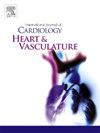Effects of transcatheter tricuspid valve replacement on hepatic and renal function in severe TR
IF 2.5
Q2 CARDIAC & CARDIOVASCULAR SYSTEMS
引用次数: 0
Abstract
Objectives
This study evaluated the impact of transcatheter tricuspid valve replacement (TTVR) on renal and hepatic function in patients with severe tricuspid regurgitation (TR).
Background
TR is associated with increased morbidity, mortality, and heart failure-related hospitalizations. Venous congestion and reduced forward stroke volume can compromise hepatic and renal function. TTVR has emerged as a promising option for high-risk patients, but its effects remain understudied.
Methods
In this prospective, multicenter study, 96 high-surgical-risk patients with severe TR (NYHA functional class III/IV) underwent LuX-Valve TTVR between September 2022 and March 2023. Follow-up at 7, 30, 180, and 360 days assessed cardiac, hepatic (total bilirubin (TBIL), direct bilirubin (DBIL), alanine aminotransferase (ALT), aspartate aminotransferase (AST), alkaline phosphatase (ALP)), and renal (serum creatinine, urea, uric acid) function.
Results
Procedural success was 95.79 %, and 93 patients survived to 12 months. All survivors exhibited TR reduction to less than grade III. Significant hepatic improvement was noted at 12 months, especially among those with preoperative liver dysfunction (LD): total bilirubin decreased from 21.54 ± 11.14 to 18.33 ± 7.82 μmol/L (P = 0.044) and direct bilirubin from 7.95 ± 4.74 to 5.92 ± 2.98 μmol/L (P = 0.005). Renal function remained stable.
Conclusions
TTVR is an effective, minimally invasive approach for severe TR, facilitating significant hepatic recovery in patients with preoperative dysfunction while preserving renal function. These findings underscore the reversibility of TR-induced hepatic impairment and demonstrate TTVR’s potential to improve clinical outcomes.
经导管三尖瓣置换术对重度TR患者肝肾功能的影响
目的探讨经导管三尖瓣置换术(TTVR)对严重三尖瓣反流(TR)患者肝肾功能的影响。背景:tr与发病率、死亡率和心力衰竭相关住院率增加有关。静脉充血和前搏量减少可损害肝肾功能。TTVR已成为高风险患者的一种有希望的选择,但其效果仍未得到充分研究。方法:在这项前瞻性、多中心研究中,96名高手术风险的严重TR患者(NYHA功能级III/IV)在2022年9月至2023年3月期间接受了LuX-Valve TTVR。随访7、30、180和360天,评估心脏、肝脏(总胆红素(TBIL)、直接胆红素(DBIL)、丙氨酸转氨酶(ALT)、天冬氨酸转氨酶(AST)、碱性磷酸酶(ALP))和肾脏(血清肌酐、尿素、尿酸)功能。结果手术成功率95.79%,93例患者存活至12个月。所有幸存者的TR均降低至III级以下。12个月肝功能明显改善,尤其是术前肝功能不全(LD)患者:总胆红素从21.54±11.14降至18.33±7.82 μmol/L (P = 0.044),直接胆红素从7.95±4.74降至5.92±2.98 μmol/L (P = 0.005)。肾功能保持稳定。结论sttvr是一种有效的微创治疗严重TR的方法,可促进术前功能障碍患者肝脏恢复,同时保留肾功能。这些发现强调了tr诱导的肝损害的可逆性,并证明了TTVR改善临床结果的潜力。
本文章由计算机程序翻译,如有差异,请以英文原文为准。
求助全文
约1分钟内获得全文
求助全文
来源期刊

IJC Heart and Vasculature
Medicine-Cardiology and Cardiovascular Medicine
CiteScore
4.90
自引率
10.30%
发文量
216
审稿时长
56 days
期刊介绍:
IJC Heart & Vasculature is an online-only, open-access journal dedicated to publishing original articles and reviews (also Editorials and Letters to the Editor) which report on structural and functional cardiovascular pathology, with an emphasis on imaging and disease pathophysiology. Articles must be authentic, educational, clinically relevant, and original in their content and scientific approach. IJC Heart & Vasculature requires the highest standards of scientific integrity in order to promote reliable, reproducible and verifiable research findings. All authors are advised to consult the Principles of Ethical Publishing in the International Journal of Cardiology before submitting a manuscript. Submission of a manuscript to this journal gives the publisher the right to publish that paper if it is accepted. Manuscripts may be edited to improve clarity and expression.
 求助内容:
求助内容: 应助结果提醒方式:
应助结果提醒方式:


